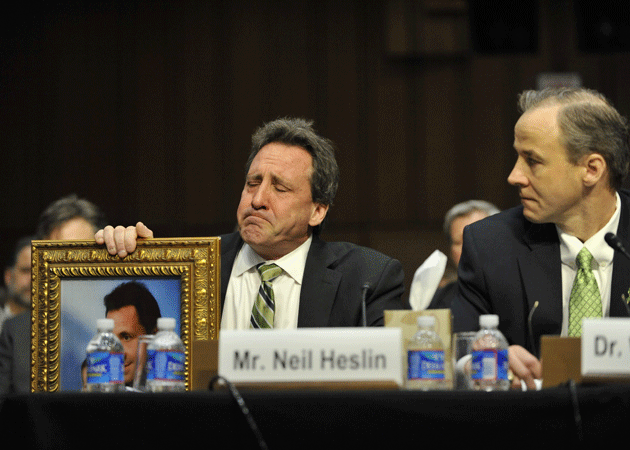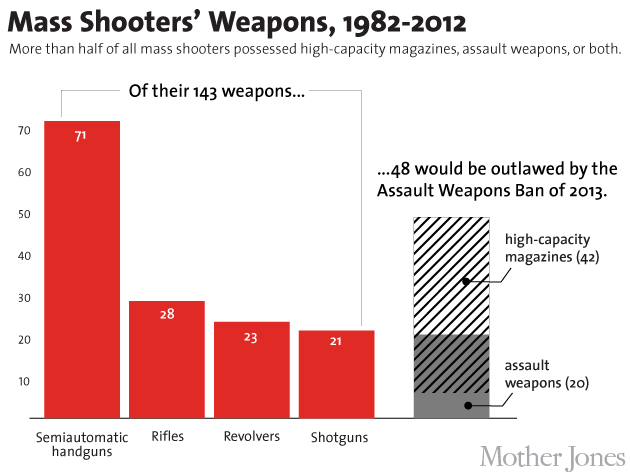
Neil Heslin, father of Sandy Hook victim Jesse Lewis, testifies at a Senate hearing on assault weapons.Jay Mallin/ZUMAPress
“Newtown changed America,” said Sen. Richard Blumenthal during Wednesday’s Judiciary Committee hearing on the proposed Assault Weapons Ban of 2013. Few would dispute Blumenthal’s sentiment about the recent gun massacre in his home state of Connecticut, but the pressing question now is: What is Congress prepared to do about it?
Neil Heslin, whose six-year-old son, Jesse Lewis, was among the 20 first-graders murdered at Sandy Hook Elementary School in December, gave further heartbreaking testimony. Lawmakers from both parties repeated assurances that they were united in the goal of reducing gun violence. But familiar, entrenched arguments again ruled the day, and there was little expectation that the bill authored by Sen. Dianne Feinstein (D-Calif.)—whose ban would include scores of specific weapons and ammunition magazines exceeding 10 rounds—has a chance of passing, lacking support as it does even from top members of her own party.
Feinstein opened the hearing by tracing a grim history of mass gun violence, from a clock tower in Austin in 1966 to the grade school in Newtown. She pointed out that there have been at least 62 mass shootings over the last 30 years in the United States and that they’ve been on the rise in recent years, as our investigation at Mother Jones showed. She cited Supreme Court rulings that affirmed the constitutionality of restricting some guns, including District of Columbia v. Heller, which overturned DC’s ban on handguns but found “support in the historical tradition of prohibiting the carrying of dangerous and unusual weapons.”
Senate Republicans on the committee were unmoved. Any laws should target criminals, not “law-abiding gun owners,” argued Ted Cruz, the freshman from Texas. Chuck Grassley went with his usual refrain blaming the problem on violent video games (for which there is no persuasive evidence of a link) and made an odd reference to federal enforcement of marijuana laws. Lindsey Graham got into a heated debate with Milwaukee Police Chief Edward Flynn, arguing against expanding federal background checks, despite that polls show strong support for the idea among the American public.
“When almost 80,000 people fail a background check and 44 people are prosecuted, what kind of deterrent is that?” Graham asked. To which Flynn replied, “It doesn’t matter, it’s a paper thing. I want to stop 76,000 people from getting guns illegally. That’s what a background check does,” eliciting applause from the audience. (Republicans in the House on Wednesday shared Graham’s disdain for universal background checks.)
Republicans also pointed to Justice Department reviews of Feinstein’s previous Assault Weapons Ban of 1994, claiming that DOJ found it ineffective. One of those studies (PDF)—published seven years before the ban expired in 2004—acknowledges that it could not “detect any reduction to date in two types of gun murders that are thought to be closely associated with assault weapons, those with multiple victims in a single incident and those producing multiple bullet wounds per victim.” But it went on to say that “the available data are partial and preliminary, and the trends may have been influenced by law enforcement agency policies regarding bullet-proof vests.” A follow-up study (PDF) published by the same researchers three months before the ban expired concluded that its results had been mixed, and that it would be hard to predict how its absence might affect future gun crimes.
John Walsh, a US district attorney from Colorado, pushed back against GOP claims that the drop in federal gun prosecutions under President Obama indicated federal officials’ failure to enforce existing laws. Federal officials have spent “sleepless nights” pursuing cases, he said. He also asserted that magazines containing more than 10 rounds were unnecessary for self-defense—most cases he’s seen over the years, he said, typically involved the firing of just one or two bullets at close range. (There is some debate about where that line should be drawn; one veteran law enforcement official recently told Mother Jones that there is no reasonable argument for magazines with more than 15 rounds for self-defense.)
Flynn also suggested that the gun debate isn’t really about the Second Amendment. “If we want to be intellectually honest, [this has] more to do with commerce,” he said. Gun manufacturing is a nearly $12 billion business.
Comments to Mother Jones after the hearing from witnesses who testified reflected the polarized status quo. “What I’m a supporter of is addressing what is going on in our communities today with violent criminals, because criminals by their very definition do not obey the law,” said former US Rep. Sandy Adams of Florida, who as a state representative voted in 2005 for Florida’s controversial Stand Your Ground law.
Asked if he thought Feinstein’s bill stood a chance, Heslin said: “You’ve got to give it a chance, but there’s got to be many changes. It’s not just a ban on assault weapons or high-capacity magazines. Those I think are the first and foremost steps that should be taken,” he said, along with universal background checks for gun purchasers.
“What happened I will have to live with for the rest of my life,” Heslin added. “I’d like to see it never happen again. The way the laws are now, it will happen again.”

















